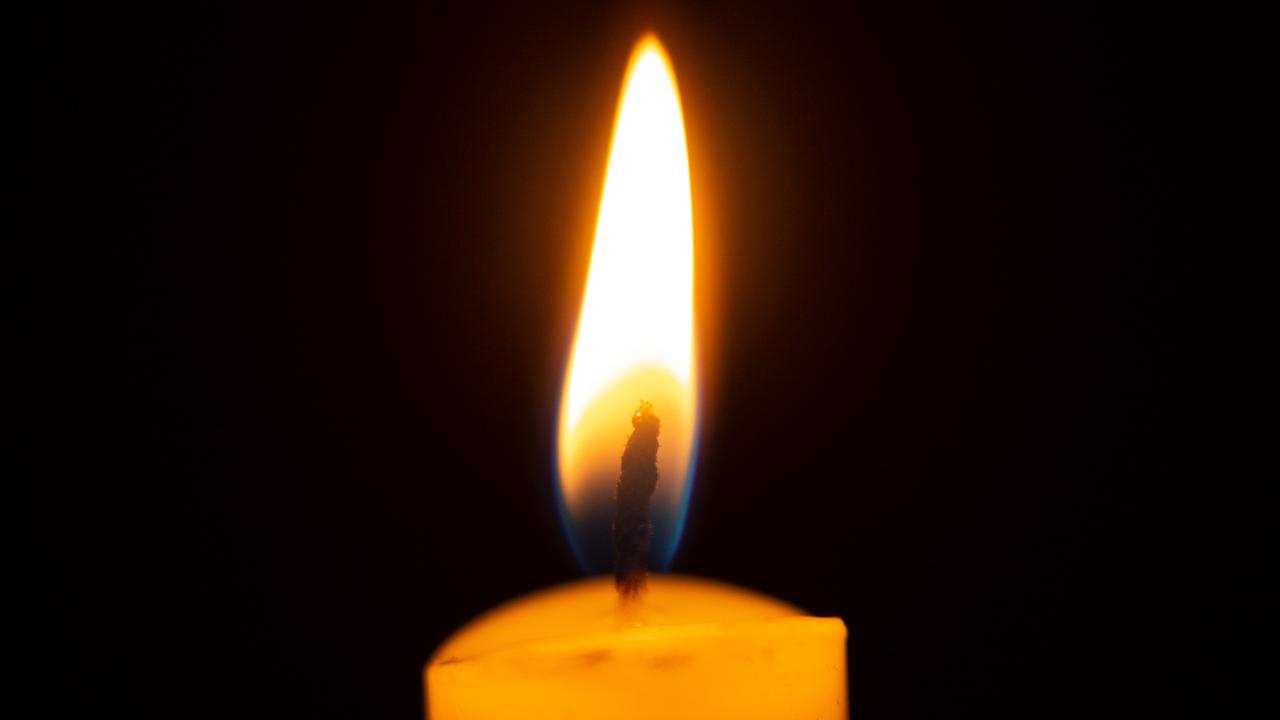‘I narrowly escaped suicide bomb’: Gold Coast MP and Assistant Minister for Defence Stuart Robert reveals close call
HE’S been shot at and narrowly missed a massive suicide bombing but this Gold Coast MP says he has ‘no fear’ visiting troops in the Middle East.
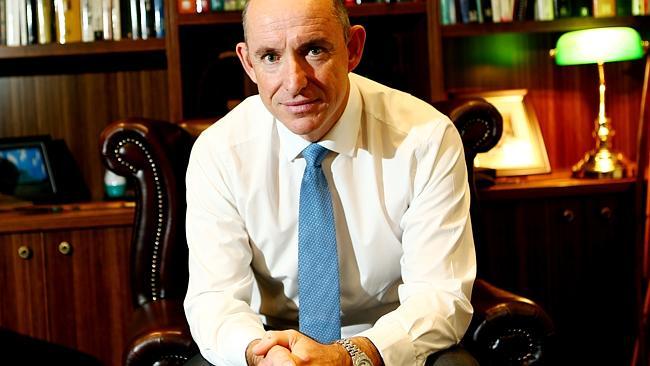
ANZAC Centenary
Don't miss out on the headlines from ANZAC Centenary. Followed categories will be added to My News.
IT was September last year when his number nearly came up.
Gold Coast MP Stuart Robert had just flown into Afghanistan for the Presidential handover from Hamid Karzai to Ashraf Ghani when he narrowly missed a huge suicide bomb explosion.
“We landed at the airport and chose to take US helicopters into the middle of Kabul which was lucky because a suicide bomb detonated at the entrance of the airport and killed 16 people,” recalls the Federal Government’s Assistant Minister for Defence.
“It happened as we flew out. They were waiting for high-valued targets in a motorcade to kill at the airport gate but we didn’t move by ground, we moved by air.
“You should’ve heard it, it was a monstrous thing. The vehicle was packed full with explosives and set off with an almighty boom.”
It’s a good thing Stuart ‘doesn’t do fear’.
In his Federal role, he has access to some of the nation’s most highly classified information and plays a key part in running the $29 billion-a-year defence operation.
Forget cushy diplomatic trips to Paris and Rome. The Fadden MP and Coast’s only minister, is sent to Middle Eastern warzones to check on the welfare and conditions of our troops.
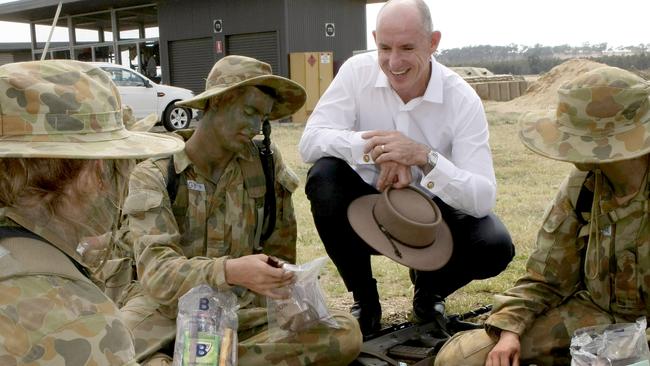
Dodging that suicide bomb attack isn’t the only hairy situation he’s encountered.
Surrounded by a team of commandos and special forces soldiers, Stuart has also been shot at driving through Kabul and watched Islamic State (IS) terrorists in their horrifying reality.
He’s been to the Middle East 10 times including four times in Afghanistan — a place often regarded as too dangerous for high-ranking politicians.
“I’ve heard lots of explosions go off — this is life in these places. Suicide attacks are a daily occurrence,” he says.
Today, he joins Australian troops in the Middle East at a location that cannot be revealed until he has safely left the region.
“It will be the only Anzac Day service where everyone is armed but me,” he says.
Stuart, a captain in the military before joining public life, sees it as his duty to travel into areas most of us think he’d be mad to visit and is a walking encyclopaedia when it comes to knowing Middle Eastern regions and dignitaries.
“Where ever you go, people have an expectation that you are going to know about them and their country and if you don’t, it shows that you don’t care,” he says.
In April last year, Stuart became the first Minister from the Australia Defence team to ever to travel to the Syrian border region of Golan Heights — a tale of two worlds with stunning vineyards on the Israeli side and machineguns constantly firing on the Syrian side.
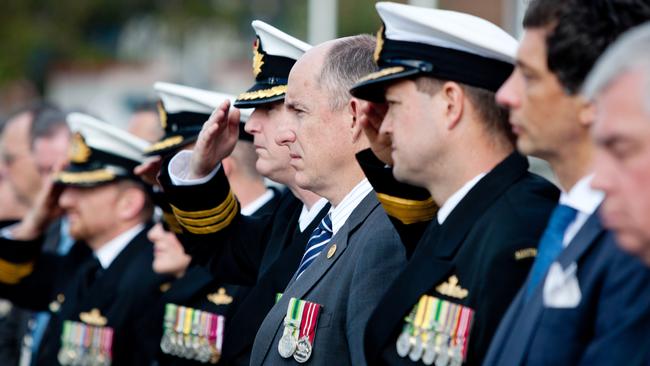
“I watched the unfolding horror of the battle in front of me,” he says, adding he watched from a United Nations observation post.
“There were four separate outbreaks of violence within one hour and looking through the binoculars you could see snipers on water towers and machine guns on mosques in direct contravention to the truce that was established in 1967 between Syria and Israel.
“Looking in an arc of about 5km you could see where the Syrian Armed Forces held the road to Damascus, the Free Syrian Army held 2km up to the north and a disparate group of about 20 terrorist organisations (including IS) held the southern parts and you could see it all which is quite extraordinary.”
Stuart says the battle against IS is “our biggest national security threat” going forward with the terror organisation expanding its reach from Iraq and Syria to also gain a foothold in Somalia, Yemen, Libya and northern Nigeria.
Far better funded than most terror organisations, IS has oil revenue and savvy social media recruiting techniques that will help continue its “murderous calls”.
“For one reason and one reason only, they don’t like our freedom. They don’t like our freedom to choose a religion, a way of life, a dress or a form of speech,” he says.
“Unlike other terrorist organisations content to stay in their battle space, ISIS is wanting a global fight and they are wanting to come and go after us.
“We can’t allow the Middle East to fall apart — and it is falling apart.
“Syria is completely screwed, Libya is a mess, Iraq is a disaster, Afghanistan has got an unsteady but hopeful future, Yemen is under assault as we speak, Somalia is completely falling apart, Boko Haram continues to have freedom of action in northern Nigeria. There are substantial issues in the Middle East and northern Africa.”
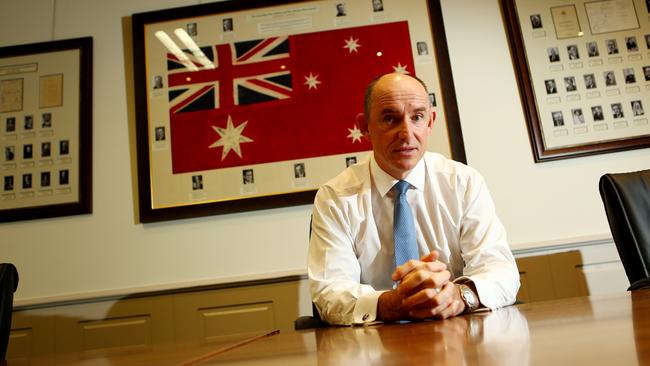
On the home front, Australia’s intelligence agency and federal police are working overtime to monitor terror chatter and stop IS fighters returning to Australia.
The passports of more than 100 Australian IS fighters have been cancelled and those who attempt to return will be blocked or arrested.
But Stuart says it is “extraordinarily hard” to stop IS reaching isolated and disconnected Australians at risk of being recruited by the fairytale ideology the group sells via social media.
“You put pressure on Facebook and Twitter to close down sites and they are very responsive but you close down one and two more pop up. It is continually being vigilant.”
“There are many layers to this. People go and fight for IS not necessarily because they are Muslim but because they are isolated and disconnected. They fall under the spell of these hate preachers and convert to the cause.”
While the war on terror occupies much of his time, the search for missing Malaysia Airlines flight MH370 continues to baffle and the return of Australians killed in the MH17 downing in Ukraine ranks among the hardest things he’s ever had to do.
Stuart was there when a C17 flew into a large hangar in Melbourne carrying bodies recovered from the MH17 wreckage.
“Inside there were nine, 10, 11, 12 hearses all lined up, the coffins were laid on trolleys and I was there with the families of the lost,” he says.
“What do you say to mum and dad who have lost three children when three little coffins come off?”
As for MH370, he has ‘no doubt’ it is somewhere in the Indian Ocean — of which 60 per cent of the search area has been covered.
“Don’t think of it as plane lying on the bottom of the ocean in tact,” he says.
“This thing would’ve fallen out of the air and fallen to earth at terminal velocity when it hit the water. It will be in millions and millions of pieces.
“This will be one of the great, difficult searches of all time.”
RANDOM FACT:
If you notice Stuart Robert wearing skull and crossbones cufflinks, don’t assume he’s a pirate. He’s actually a “deadhead”.
“When we joined Parliament in 2007, the partyroom was bemoaning how we lost the election and Senator Bill Heffernan made the point that we lost because of the ‘bunch of deadhead candidates,” Stuart explains.
“Well, seven of us had won our seats and we thought we were doing all right, thanks very much.”
So Stuart along with several now-Ministers including Scott Morrison formed the “Deadheads” class of ‘07 and had cufflinks made featuring the Pirates of the Caribbean skull, the mace of the House of Representatives and the black rod of the Senate.
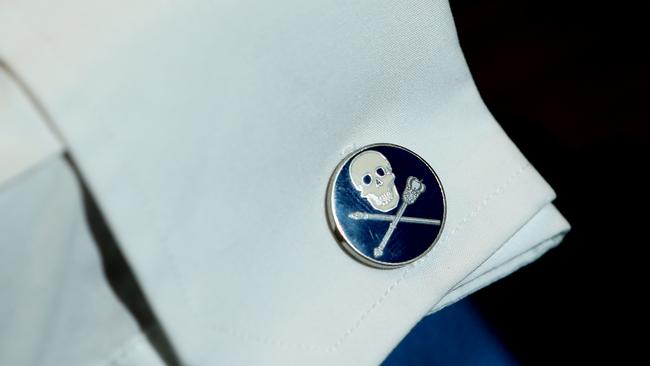
Originally published as ‘I narrowly escaped suicide bomb’: Gold Coast MP and Assistant Minister for Defence Stuart Robert reveals close call


